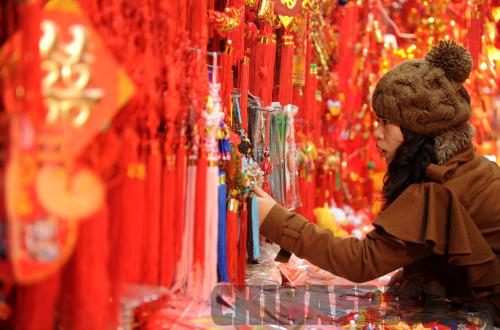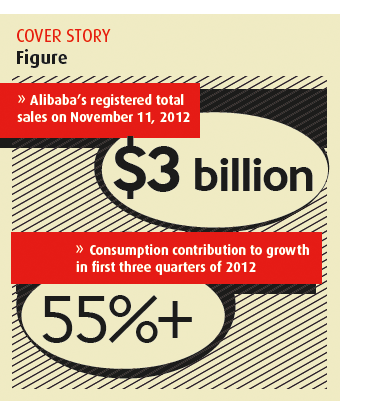A New Economic Era
CHINAFRICA by Yu Nan, February 4, 2013 Adjust font size:
 |
| A shopper browses at a market |
Tills are ringing as Chinese spend more domestically than ever before
Lin Shanshan's Singles Day started with clicks of the mouse at midnight.
The 28-year-old shopper who lives in Beijing said she searched for online bargains in advance and stored her favorite items in website shopping carts. This was to avoid wasting any time hunting down bargains when a 24-hour half-price sale kicked off last November 11, which is known as Singles' Day in China. The shopping holiday was started by e-commerce giant Alibaba Group, which operates Taobao.com and Tmall.com.
Staying up until 2:00 AM, Lin ended up spending more than 4,000 yuan (US$793) on two overcoats, three pairs of boots and bedding. Tens of millions of Internet users like Lin took advantage of the great deals on offer. By 11:00 AM that day, trade volume of Alibaba's two online shopping sites reached 7.9 billion yuan (US$1.25 billion), exceeding the 5.2 billion yuan (US$825 million) spent on Singles' Day in 2011. And their 24-hour sale on that day registered 19.1 billion yuan (US$3 billion). This figure is more than 50 percent higher than that for total online sales in 2011 on the American Cyber Monday, which falls on the first Monday after Thanksgiving, and also features attractive online sales.
Demand drives growth
Online purchases are proving to be a good indicator of China's domestic consumption. In line with the increased spending on Singles' Day, China's retail and catering industries saw a surge in sales during the country's 2012 eight-day National Day holiday. During the holiday, sales by major retail and catering enterprises rose to 800.6 billion yuan (US$127 billion), 15 percent higher than the same period in 2011, according to statistics released by China's Ministry of Commerce. The country's 119 major scenic destinations were visited by a total of 34.25 million tourists, a 20.96 percent year-on-year increase. Tourism income surged to 1.77 billion yuan ($281 million), a nearly 25 percent increase from 2011, according to the National Tourism Administration.
While some experts are worried about a possible hard landing, the better-than-expected figures reveal the strong spending power of Chinese consumers.
Last year's upward trend in domestic consumption is encouraging. Data from the National Bureau of Statistics showed that in the first three quarters of 2012, consumption contributed over 55 percent to China's economic growth, exceeding the contribution from investment for the first time since 2006. Growth in domestic consumption is key to China's economy, as the country faces weaker export and investment demand.
"Consumption's contribution exceeding that of investment sends a signal that China has made further achievements in economic restructuring," said Shen Xinmin, an economist at South China Normal University. "China has been rebalancing its economy to rely more on domestic demand."
This view is echoed by Hou Yongzhi, Director of the Development Strategy and Regional Economy Department at the State Council's Development Research Center.
Hou believes that China needs to make a gradual adjustment from an export- and investment-driven growth model to rely more on domestic consumption, while still maintaining sustainable economic growth.
In the long term, boosting consumption will play a major role in sustaining stable economic growth, outpacing investment and exports. Consumption in China, according to 2010 World Bank data, accounted for only about 35 percent of the country's GDP, far below the United States' 71 percent, Germany's 58 percent and Japan's 60 percent, and still lower than the world average of 61 percent. China's consumption potential is enormous, and has yet to be fully realized, said Liu Yuanchun, Deputy Dean of the School of Economics at Renmin University of China.



